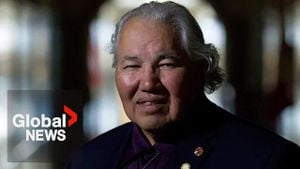Punjabi singer Diljit Dosanjh is gearing up for his highly publicized concert planned for November 15, 2024, at the Cyberabad Arena in Hyderabad as part of his 'Dil-Luminati' tour. This grand event has now come under scrutiny, with the Telangana government imposing restrictions on the songs he can perform, focusing particularly on those associated with drugs, alcohol, and violence. This directive marks a significant stance by local authorities toward shaping the kind of entertainment deemed appropriate for public audiences.
Shortly before the concert, Dosanjh shared his excitement online, posting images from the beautiful Falaknuma Palace and expressing his joy over attending local performances. His Instagram caption, which cryptically quoted, “Aandhi roke toh hum toofan... Toofan roke toh hum aag ka dariya,” stirred interest among followers but did not directly address the restrictions enforced by the government.
The Telangana government issued its notice based on concerns raised over Diljit’s previous concerts, particularly two held on October 26 and 27 at Delhi's Jawaharlal Nehru Stadium. During these shows, he reportedly performed songs with themes centered around drugs and alcohol, including popular tracks like "Patiala Peg" and "5 Taara." A local resident from Chandigarh filed the complaint, stating these performances glamorized detrimental behaviors, and provided video evidence to support his claims.
Besides the music content restriction, the notice issued by the Department of Welfare for Women and Children, Disabled and Senior Citizens, has highlighted the need to protect younger audience members. It cautioned against using children as stage props during the concert, underlining the risks associated with high decibel levels and bright lights, which can be harmful to children's health. The notice pointed out WHO guidelines recommending adults be exposed to peak sound levels not exceeding 140 decibels, and for children's exposure to remain below 120 decibels—a measure aimed at safeguarding the welfare of young concertgoers.
Despite this cloud of controversy, the enthusiasm among fans remains high. The Hyderabad concert is expected to draw over 20,000 attendees, and local police are preparing for crowd control and traffic management to accommodate the influx of concertgoers. Dosanjh's tour has not been without its challenges, as many fans had complaints about chaotic conditions, poor management, and inadequate facilities at his earlier shows.
The action taken by Hyderabad officials reflects broader societal concerns about the influence of popular culture on youth, and it speaks to the proactive measures the government wishes to implement within the entertainment sector. The notice surrounding Dosanjh's performances will undoubtedly reignite discussions around artists' social responsibilities, the themes they promote through their music, and the perceptions of their artistic expressions.
This isn’t the first controversy surrounding Dosanjh's tour. His performances have faced backlash before over accusations of causing damage to the venues used and poor organization. These issues have drawn criticism not just from fans but also from those involved with the venues, leading to calls for more coordinated efforts to manage large-scale events effectively.
Nonetheless, Diljit Dosanjh continues to enjoy immense popularity across India, celebrated for his energetic performances and cross-over appeal between music and acting. Following the Hyderabad show, the 'Dil-Luminati' tour will progress to Ahmedabad, Lucknow, Pune, Kolkata, Mumbai, and finally conclude in Guwahati on December 29. With each new concert, the demands for appropriate entertainment versus artistic freedom will remain key points of discussion.
Gone are the days when artists solely focused on garnering applause from the crowd; the modern artist must now tread carefully, paying attention to the cultural and societal impacts of their work. For Dosanjh, the upcoming Hyderabad concert serves as both a celebration of his career and as a crucible—where the artist’s creative impulses and state guidelines meet head-on. Will Diljit heed the warnings and adhere to the constraints laid out by the Telangana government, or will he use this as fuel for artistic expression where he plays the songs audiences clamored for, albeit cautiously and surely?



